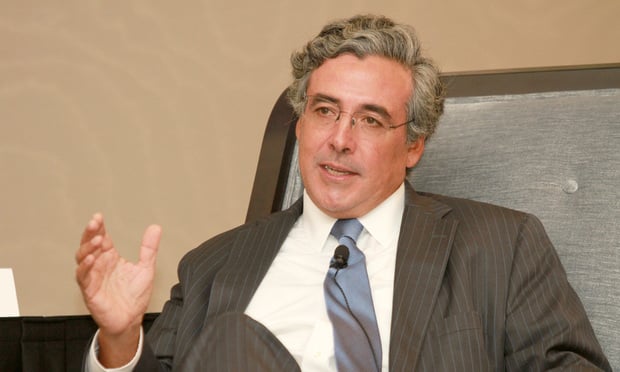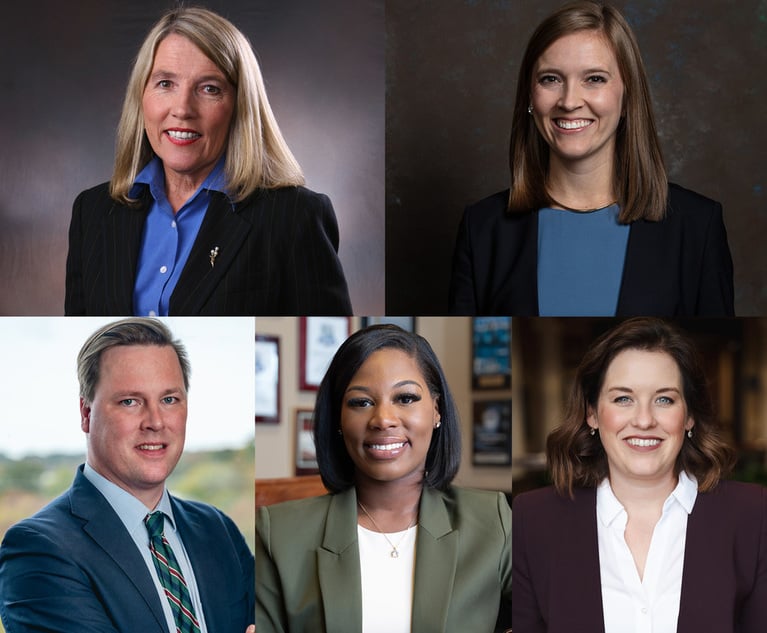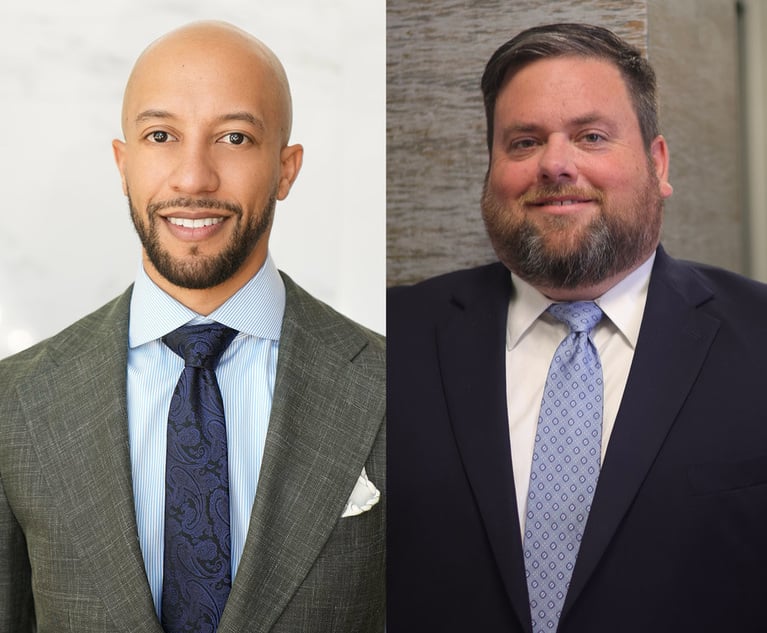Noel Francisco Discusses How He Prepares for the Nation's Biggest SCOTUS Hearings
The U.S. solicitor general said he enjoys getting to pick which cases he will personally argue each term, but there are some he knows he's expected to take.
September 06, 2019 at 07:58 PM
6 minute read
 Noel Francisco, Solicitor General of the United States, during a fireside chat at the 2019 ABA Southeastern White Collar Crime Institute, Sept. 6. Photo: John Disney/ALM
Noel Francisco, Solicitor General of the United States, during a fireside chat at the 2019 ABA Southeastern White Collar Crime Institute, Sept. 6. Photo: John Disney/ALM
A perk of being the solicitor general of the United States is getting to hand pick which cases to personally argue before the U.S. Supreme Court. You may even decide some cases aren't worth defending.
But when the justices agreed to hear arguments in October as to whether Title VII of the U.S. Civil Rights Act bars employers from discriminating against gay and lesbian employees, an issue that's created a circuit split and drawn intense public interest, Solicitor General Noel Francisco said he knew he would be expected to argue the government's position that it does not.
Similarly, when the high court scheduled arguments on a challenge to President Donald Trump's decision to end protection for undocumented immigrants brought to the U.S. as children under the Deferred Action for Childhood Arrivals program, Francisco knew he'd again be donning his morning coat for a November trip to the Supreme Court.
Francisco said he usually argues one case a month when the Supreme Court court is in session.
"Typically the ones that are most consequential to the government or the administration," he said, while speaking during a wide-ranging "fireside chat" with Atlanta appellate specialist Amy Weil. The discussion came during the American Bar Association's White Collar Crime Institute held at north Georgia's Chateau Elan.
When not taking up the government's biggest legal fights, Francisco said he's looking for interesting cases in which he can zero in on key points of law, moot courting his arguments twice before boiling them down to the most central issues.
"I try to plot 30 minutes worth of arguments with no questions," he said. "When I get to the podium, I have two pieces of paper with 10 points to be ready for."
When finished, "I ask myself, 'did I have to answer any questions I wasn't prepared for?' That's how I judge my performance," Francisco said.
A former clerk for Justice Antonin Scalia, Francisco was an associate at what was then Cooper, Carvin & Rosenthal in Washington, D.C., when he joined the team fighting the 2000 recount in Bush v. Gore. His side won.
Francisco was later among the lawyers former President George W. Bush tapped for a position as associate White House counsel before then moving over to the Office of Legal Counsel.
"They were very different jobs," said Francisco. "As White House counsel, there's tons of legal issues but only an hour to resolve them."
Snap decisions on executive actions were "really the intersection of law and politics," he said.
It was also "more fun," said Francisco, recalling running into celebrities like Bo Derek, Bono and Bruce Willis as he bounced around the White House.
"The OLC side was more interesting from a legal and policy perspective," he said.
In 2005, he moved on to Jones Day, where he helped develop a practice focusing on litigating against the federal government. He appeared several times at the High Court, successfully arguing to have the corruption conviction of former Virginia Gov. Bob McDonnell overturned, and to have President Barack Obama's recess appointments to the National Labor Relations Board invalidated.
Asked by Weil if he were surprised that McDonnell's conviction was dumped in a unanimous Supreme Court ruling given the strong evidence that the governor had taken more than $100,000 in improper gifts and loans, Fransisco said he was not.
McDonnell "arranged meetings," said Francisco, but "never tried to put his thumb on the outcome of those meetings."
"I was confident that if were able to preserve our arguments on appeal, we'd win," he said. "That's the thing about the Supreme Court. If you can preserve your issues and get it the court, you'll win."
After becoming solicitor general for the Trump administration in 2017, Francisco said he was troubled by criminal cases in which prosecutors charged defendants on shaky legal grounds, often winning at the trial and appellate levels, only to have "a lot of lopsided, 9-0 decisions" by the justices reversing the convictions.
As an example, he pointed to a 2014 decision in which a Colorado woman allegedly put chemical agents on another woman's doorknobs and mailbox in retribution for allegedly having an affair with her husband.
The target woman was not seriously injured "and state prosecutors didn't think it was worth their time," said Francisco.
But the U.S. attorney prosecuted Bond for violating the Chemical Weapons Convention treaty. The trial court and U.S. Court of Appeals for the Tenth Circuit allowed the prosecution, but the justices reversed with five joining the majority opinion written by Chief Justice John Roberts, and concurring opinions from Scalia, Clarence Thomas and Samuel Alito.
"As prosecutors, we need to make sure we are well grounded in the text of the statutes and are pushing the boundaries, and are using good judgment," he said. "What bothers me is not that you're being an aggressive prosecutor, but are not mindful of the implications for another doctrine."
That also includes declining to defend cases when the legal underpinnings are suspect, he said.
To that end, Francisco said he stays in contact with U.S. attorneys around the country in an effort to collaborate and make sure the laws are being applied uniformly in every jurisdiction, and to "admit error when you think you got it wrong."
"If the solicitor general is seen as sitting in some ivory tower in Washington, that's not a very effective way to run the office," he said.
 From left, Jay E. Town, U.S. Attorney Northern District of Alabama, Charles "Charlie" E. Peeler, U.S. Attorney Middle District Georgia and Bobby L. Christine, U.S. Attorney Southern District Georgia were part of a panel discussing "White Collar Enforcement Under New Department of Justice Leadership: What Areas Should Practionners Look For?" The session was moderated by BJ Pak, U.S. Attorney Northern District Georgia. The panel discussion was part of the 2019 ABA Southeastern White Collar Crime Institute held at Chateau Elan Winery and Resort outside of Atlanta. Photo: John Disney/ALM
From left, Jay E. Town, U.S. Attorney Northern District of Alabama, Charles "Charlie" E. Peeler, U.S. Attorney Middle District Georgia and Bobby L. Christine, U.S. Attorney Southern District Georgia were part of a panel discussing "White Collar Enforcement Under New Department of Justice Leadership: What Areas Should Practionners Look For?" The session was moderated by BJ Pak, U.S. Attorney Northern District Georgia. The panel discussion was part of the 2019 ABA Southeastern White Collar Crime Institute held at Chateau Elan Winery and Resort outside of Atlanta. Photo: John Disney/ALMThis content has been archived. It is available through our partners, LexisNexis® and Bloomberg Law.
To view this content, please continue to their sites.
Not a Lexis Subscriber?
Subscribe Now
Not a Bloomberg Law Subscriber?
Subscribe Now
NOT FOR REPRINT
© 2025 ALM Global, LLC, All Rights Reserved. Request academic re-use from www.copyright.com. All other uses, submit a request to [email protected]. For more information visit Asset & Logo Licensing.
You Might Like
View All
'Didn't Notice Patient Wasn't Breathing': $13.7M Verdict Against Anesthesiologists
12 minute read
Trial Court Had No Authority to Reopen Voir Dire After Jury Impaneled in Civil Case, State Appellate Court Rules

'Pushed Into Oncoming Traffic': $5.85M Settlement in Mediated Auto Tort
6 minute readTrending Stories
Who Got The Work
J. Brugh Lower of Gibbons has entered an appearance for industrial equipment supplier Devco Corporation in a pending trademark infringement lawsuit. The suit, accusing the defendant of selling knock-off Graco products, was filed Dec. 18 in New Jersey District Court by Rivkin Radler on behalf of Graco Inc. and Graco Minnesota. The case, assigned to U.S. District Judge Zahid N. Quraishi, is 3:24-cv-11294, Graco Inc. et al v. Devco Corporation.
Who Got The Work
Rebecca Maller-Stein and Kent A. Yalowitz of Arnold & Porter Kaye Scholer have entered their appearances for Hanaco Venture Capital and its executives, Lior Prosor and David Frankel, in a pending securities lawsuit. The action, filed on Dec. 24 in New York Southern District Court by Zell, Aron & Co. on behalf of Goldeneye Advisors, accuses the defendants of negligently and fraudulently managing the plaintiff's $1 million investment. The case, assigned to U.S. District Judge Vernon S. Broderick, is 1:24-cv-09918, Goldeneye Advisors, LLC v. Hanaco Venture Capital, Ltd. et al.
Who Got The Work
Attorneys from A&O Shearman has stepped in as defense counsel for Toronto-Dominion Bank and other defendants in a pending securities class action. The suit, filed Dec. 11 in New York Southern District Court by Bleichmar Fonti & Auld, accuses the defendants of concealing the bank's 'pervasive' deficiencies in regards to its compliance with the Bank Secrecy Act and the quality of its anti-money laundering controls. The case, assigned to U.S. District Judge Arun Subramanian, is 1:24-cv-09445, Gonzalez v. The Toronto-Dominion Bank et al.
Who Got The Work
Crown Castle International, a Pennsylvania company providing shared communications infrastructure, has turned to Luke D. Wolf of Gordon Rees Scully Mansukhani to fend off a pending breach-of-contract lawsuit. The court action, filed Nov. 25 in Michigan Eastern District Court by Hooper Hathaway PC on behalf of The Town Residences LLC, accuses Crown Castle of failing to transfer approximately $30,000 in utility payments from T-Mobile in breach of a roof-top lease and assignment agreement. The case, assigned to U.S. District Judge Susan K. Declercq, is 2:24-cv-13131, The Town Residences LLC v. T-Mobile US, Inc. et al.
Who Got The Work
Wilfred P. Coronato and Daniel M. Schwartz of McCarter & English have stepped in as defense counsel to Electrolux Home Products Inc. in a pending product liability lawsuit. The court action, filed Nov. 26 in New York Eastern District Court by Poulos Lopiccolo PC and Nagel Rice LLP on behalf of David Stern, alleges that the defendant's refrigerators’ drawers and shelving repeatedly break and fall apart within months after purchase. The case, assigned to U.S. District Judge Joan M. Azrack, is 2:24-cv-08204, Stern v. Electrolux Home Products, Inc.
Featured Firms
Law Offices of Gary Martin Hays & Associates, P.C.
(470) 294-1674
Law Offices of Mark E. Salomone
(857) 444-6468
Smith & Hassler
(713) 739-1250







